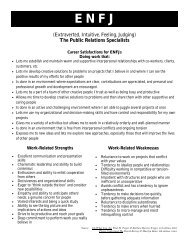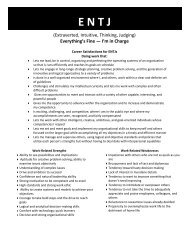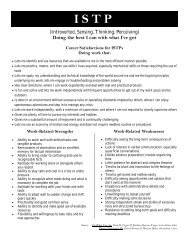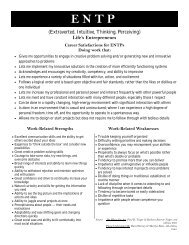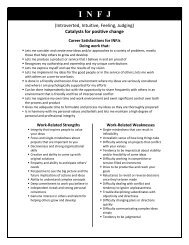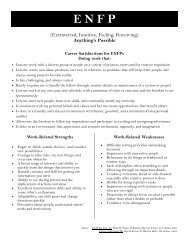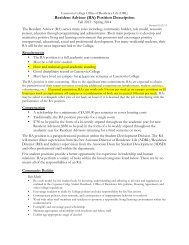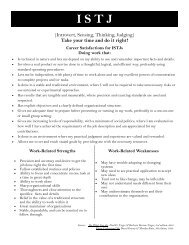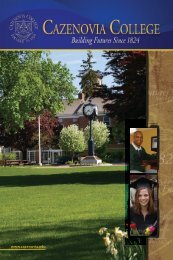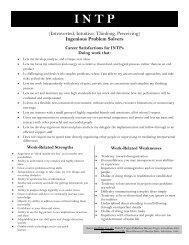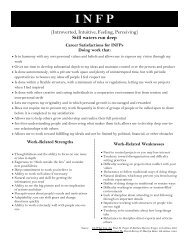of
2013-14 Academic Catalog - Cazenovia College
2013-14 Academic Catalog - Cazenovia College
- No tags were found...
You also want an ePaper? Increase the reach of your titles
YUMPU automatically turns print PDFs into web optimized ePapers that Google loves.
CJ 359 Forensic Psychology<br />
3 credits (CS)<br />
This course is an introduction to the science and practice <strong>of</strong><br />
psychology as applied to the law and the criminal justice<br />
system. Students will examine the major concepts, theories,<br />
and research findings in psychology as they relate to a broad<br />
range <strong>of</strong> legal issues, including the function and participants<br />
<strong>of</strong> the legal system, crime and criminal investigation, civil and<br />
criminal cases, and ethics. (Offered every other year)<br />
Prerequisite: SB 120 Introduction to Psychology<br />
CJ 360 Financing Terrorism Investigation<br />
3 credits (CS)<br />
This course will explore the nature <strong>of</strong> and the methods used<br />
by terrorists to obtain and launder money to support their<br />
illegal operations. Students will study the connections among<br />
corrupt government <strong>of</strong>ficials, super-wealthy sponsors, and<br />
narco-terrorist kingpins. The course will identify and analyze<br />
both U.S. laws and international laws used to combat the flow<br />
<strong>of</strong> terrorist money. Prerequisite: CJ 151 Introduction to<br />
Criminal Justice Functions and Processes, or permission <strong>of</strong><br />
the instructor; AC 110 Fundamentals <strong>of</strong> Accounting is<br />
suggested.<br />
CJ 398 Criminal Justice and Homeland Security<br />
Internship<br />
6 credits (CS)<br />
This course provides students with the opportunity to assess<br />
their interests and apply their classroom knowledge in a<br />
supervised internship experience in an area <strong>of</strong> criminal justice<br />
or Homeland Security. Prerequisite: CJ 151 Introduction to<br />
Criminal Justice Functions and Processes, and students must<br />
have junior or senior status and permission <strong>of</strong> the instructor.<br />
Communication Studies<br />
CM 110 Introduction to Human Communication<br />
3 credits (AS)<br />
This is an introductory survey course focused on the<br />
study <strong>of</strong> human communication. Students will examine<br />
the process <strong>of</strong> communication to better understand selfawareness,<br />
interpersonal relationships, group dynamics,<br />
and public interaction. This course provides the building<br />
blocks for further study in each <strong>of</strong> these areas. (Offered<br />
fall term)<br />
CM 121 Effective Speaking<br />
3 credits (AS)<br />
Students will learn the fundamentals <strong>of</strong> effective speaking<br />
through the preparation and in-class presentation <strong>of</strong><br />
numerous short speeches. Consideration is given to<br />
general communication patterns, particularly persuasion.<br />
This course is an All-College graduation requirement.<br />
(Offered fall and spring terms)<br />
CM 210 Interpersonal Communication<br />
3 credits (AS)<br />
Interpersonal communication lies at the heart <strong>of</strong> all<br />
relationships. In this course students will examine<br />
interpersonal communication, including the presentation<br />
<strong>of</strong> the self; the development and maintenance <strong>of</strong><br />
relationships; the management <strong>of</strong> interpersonal conflict;<br />
and the impact <strong>of</strong> individual communication styles and<br />
competencies in each <strong>of</strong> these areas. By studying<br />
interpersonal communication students can better<br />
understand themselves and others as individuals and as<br />
partners in relationships. (Offered fall term)<br />
CJ 498 Criminal Justice Internship II<br />
3 credits (CS)<br />
This course provides students with the opportunity to assess<br />
their interest and apply their classroom knowledge in a<br />
supervised internship experience in an area <strong>of</strong> criminal justice.<br />
Prerequisites: Permission <strong>of</strong> instructor only<br />
CJ 499 Senior Capstone<br />
3 credits (CS)<br />
The Senior Capstone project provides an opportunity for<br />
students, in close consultation with the instructor, to define<br />
and conduct research appropriate to the conclusion <strong>of</strong> the<br />
undergraduate program <strong>of</strong> study, write a major paper, and to<br />
present the findings to an audience comprised <strong>of</strong> peers and<br />
teachers. It is a distinct effort that demonstrates the student’s<br />
knowledge and expertise as a graduating senior. Objectives <strong>of</strong><br />
the course include the continuing development <strong>of</strong><br />
communication skills (written and oral), critical thinking,<br />
problem-solving, social interaction, and computer literacy<br />
skills. Upon completion <strong>of</strong> this course, the student will be<br />
expected to demonstrate the ability to research and present a<br />
topic in criminal justice or homeland security studies.<br />
Prerequisite: Students must be eligible for graduation at the<br />
end <strong>of</strong> the term in which the seminar is taken.<br />
CM 211 Introduction to Broadcasting<br />
3 credits (CS)<br />
This course provides an introduction to the world <strong>of</strong><br />
radio and television broadcasting by combining a<br />
foundation <strong>of</strong> classroom study with hands-on experience<br />
at WITC, the Cazenovia College radio station. Students<br />
will learn the fundamentals <strong>of</strong> on-air performance.<br />
(Offered fall and spring terms)<br />
CM 220 Group Communication<br />
3 credits (AS)<br />
This course examines communication and social<br />
interaction in small groups. Students will gain an<br />
understanding <strong>of</strong> group communication and improve their<br />
skills as effective group members. Topics covered will<br />
include: the structure and creation <strong>of</strong> groups and teams;<br />
listening and communication strategies; creative and<br />
critical thinking in groups; management <strong>of</strong> conflict within<br />
the group; and problem solving. (Offered alternate spring<br />
terms)<br />
CM 230 Nonverbal Communication<br />
3 credits (AS)<br />
Does what you wear communicate? Does where you stand<br />
communicate? Students in this course will examine<br />
communication beyond verbal interaction. Topics covered<br />
Academic Catalog | Cazenovia College | www.cazenovia.edu 145



